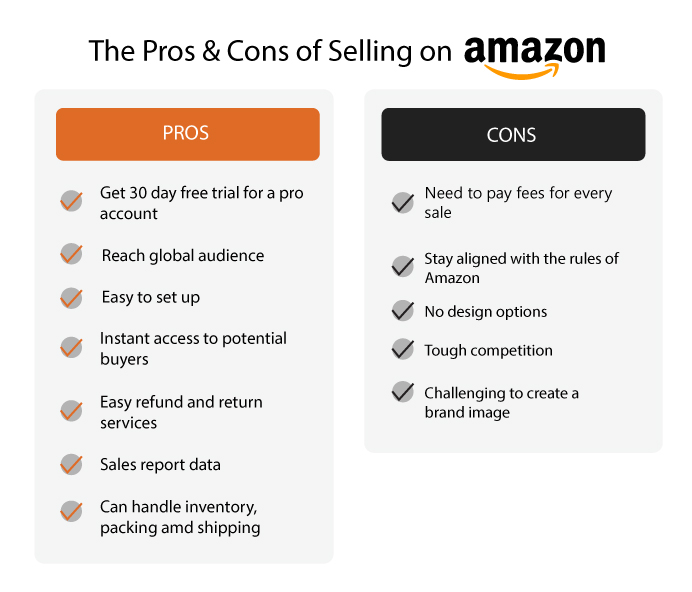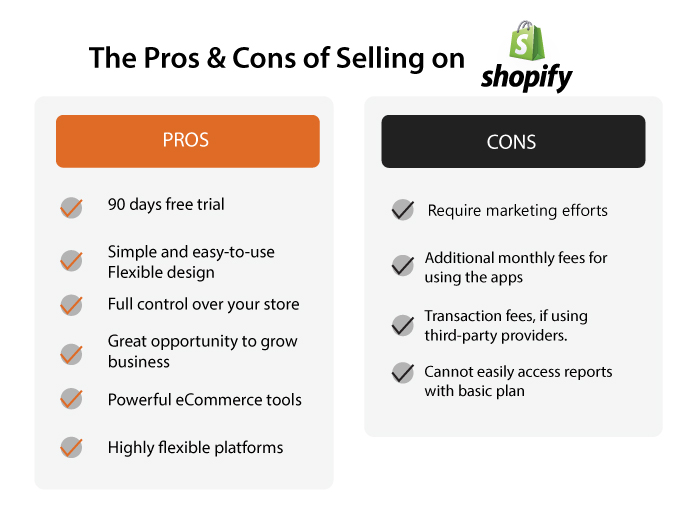Shopify vs Amazon – Which One is Best For You? [2024]
Confused between Shopify Vs Amazon? Read this blog post to know which platform is better for you. In this post, I will compare both Amazon and Shopify from various aspects.
In the past few years, the customer’s shopping habits have changed from offline to online. Today, more and more customers are shopping online than ever before! Thanks to the eCommerce platforms such as Shopify and online marketplaces such as Amazon that makes it possible for the business to connect with their customers online.
The eCommerce marketing growing, and that too, rapidly! One report by Statista revealed that the retail eCommerce sales is expected to reach whopping $7.4 trillion by 2025. If you are also a business owner looking to dive into this online selling race, then there are multiple ways to do that. Amazon and Shopify are two of the most popular names amongst the online sellers that you might have heard a thousands of times before.
If you are a business enthusiast confused between these two platforms to start selling your products online, then reading this blog post may help you. In this post, I will point out all the major differences between Shopify Vs Amazon, which will help you choose the right selling platform for you.
Table of Contents
- What is the Difference between Shopify and Amazon?
- Amazon vs Shopify: Pros & Cons
- Which is Right for my Business: Shopify Versus Amazon?
- Over to You
What is the Difference between Shopify and Amazon?
Shopify and Amazon both are best of their kinds! One is a self-hosted eCommerce platform that allows online eCommerce store creation, while other is a leading online marketplace. Let’s consider having look at the key difference between Amazon and Shopify.
| Shopify | Amazon | |
| Type of Platform | Website-builder and host | Third-party marketplace |
| Description | Shopify is an excellent eCommerce focused content management system with amazing features. | Amazon is established online store for selling products. |
| Pricing | $29 to $299 per month | $0.99 per unit sold for individual plan & $39.99 for professional plan |
| Key Features | Hosting and Analytics integrations | Established customer base and simple sign-up |
| Areas of Improvement | Offers free trials but no free plans | Strict rules and guidelines, and no design options |
| Support | Offers 24/7 assistance, video-tutorials and stepwise instruction guide | Avail support via phone call, chat or email |
| Templates and Design | Complete control over the look and design of your store | No control over the design of Amazon store |
In some instances, Shopify and Amazon seem to be similar. But they are actually not! Let’s compare Amazon and Shopify from various aspects and figure out the key differences.
Ease of Use
The store owners can easily start selling online on Amazon by setting up their account and adding product details. Amazon is a leading eCommerce marketplace, and has a wide customer base with its global popularity. The platform allows the businesses to start selling their products to the global customers using few easy steps. Moreover, the order fulfillment facility is also provided to the businesses by Amazon, making the operations more smoother.
On the other hand, Shopify allows creating self-hosted eCommerce store, which may require a custom domain, website design, and a lot of more stuff to get the products online. Apart from that, it can also be comparatively challenging for the business to handle the orders, shipments, and inventory for the orders placed through Shopify.
Selling online is comparatively easy on Amazon as compared to Shopify. Therefore, Amazon clearly beats Shopify when it comes to business easiness.
Design Flexibility
Store’s design plays a vital role in branding and also affects the user experience of the customers. It is essential to have a store design that aligns with your brand and the products that you are selling.
Amazon is an eCommerce marketplace that allows the business to sell products to its global customers. In Amazon, the businesses have no control over the look and feel of how their products will be displayed to the customers. This makes Amazon a less preferred platform if you are looking to build a brand in the long go.
On the other hand, Shopify allows creating online store from scratch and the store owner can have complete control over the look and feel of the store. Moreover, there are plenty of paid and free Shopify themes available on the store that gives more power to the store owners to design their store.
Therefore, in terms and design flexibility, Shopify clearly defeats Amazon.
Tools & Features
The eCommerce tools and features are crucial elements that needs to be taken into consideration. Amazon is built for the sellers to sell online and the buyers to purchase products from them. It empowers the businesses with essential selling tools and features that makes online selling easier. Some of the notable features includes email notifications, gift options, multiple user access, business reports, custom promotions, etc. Moreover, Amazon also takes care of the order fulfilment part and delivers the products to the end customer from the seller, so that businesses do not have to worry about the shipping stuffs.
Shopify also comes with plenty of essential online selling tools and functionalities such as inventory management, automated tax calculator, abandoned cart recovery, etc. Moreover, it also allows the businesses to add more features and functionalities through the Shopify Apps available on the store.
Therefore, both Shopify and Amazon have comes with great tools and features. However, Shopify gets an edge when it comes to custom functionalities and features through its apps.
Attracting Customers
With fierce competition in the eCommerce world, it is bit-challenging to attract buyers. This is where Amazon comes into the picture! Amazon has millions of customers and does not require much marketing effort. But, the only disadvantage is that amongst the millions of visitors, it is essential to get your products instead of your competitors. The competition on Amazon is pretty more.
Shopify does not have a wide customer base and are required to create their own brand identity. Continuous marketing efforts should be made to increase your customer base.
Hence, Shopify is the best option that can help you with every step of the way.
Support
Amazon has a forum where the users are required to post their queries and can avail the support. Even you get support via phone call, where the user can request a call and the support person gets in contact with you. It does not have the clear support system.
Shopify offers the best customer support, and you can even contact Shopify support and get in contact with Shopify experts in case of any queries. You can even find answers to the solution of your queries from Shopify documents or video tutorials. Additionally, you can get 24/7 support via phone call, live chat, or email, and the support team will get back to you within short time frame.
Thus, Shopify is provided with multiple options and even offers flexible support options as compared to Amazon.
Cost
When comparing Amazon and Shopify, fees play an essential role in decision-making. To start selling on Amazon, you need to select from the two pricing plans, either: individual or professional. Similarly, on the other hand, the individual plan starts from $0.99 per unit sold, and the professional plan costs $39.99 per month. Amazon also collects a referral fee for every single item sold, depending on the category.
For a successful eCommerce business, it must help provide great value and gain profits. Generally Shopify has three main pricing plans: Basic plan at $29 per month, Shopify plan at $79 per month, and Advanced Shopify plan at $299 per month. You will not be provided with the reports for the basic plan and is required to pay extra charges for using paid apps.
Here, Amazon is quite affordable, scalable and transparent with its pricing in comparison to Shopify.
Amazon vs Shopify: Pros & Cons
Like two sides of the coin, such an eCommerce platform has both advantages and disadvantages.
The Pros & Cons of Selling on Amazon
Amazon is one of the most popular eCommerce that is easy to use. Setting up a seller profile and adding images is simple, and there are number of back-end sections you need to complete. You are even allowed to have 30 days Amazon pro trial. This makes it easy to list the products and start selling products infront of right audience. Likewise Amazon, shopify, walmart.com, and alsoalternatives to eBay are there with different advantages and disadvantages for online selling platforms.

The Pros & Cons of Selling on Shopify
Let’s now look at Shopify. Shopify is one of the leading eCommerce platforms and is the go-to-choice for many. It is best suited for beginners and start-ups to start online without much technical expertise. Due to its simplicity, easy-to-use interface, and a wide variety of designs, it is a great place to start for newbies or those willing to start their online business with little or no skills. Shopify allows store owners to create a top-notch webstore on their own.
Building a new online store can be exciting. Moreover, it just doesn’t end up by building a store, and you need to lure new customers and drive sales.

Thus, with Shopify, the pros just keep on coming! Here, you can easily get access to basic plan, design, and create your online store. Avail of 90 days free trial and can even use Shopify payments without any cost that helps determine how your online store works for you. Shopify is a highly flexible platform comprising efficient tools and apps required to grow and expand your online store.
Which is Right for my Business: Shopify Versus Amazon?
There are multiple advantages as well as disadvantages for both these options. Amazon offers you with a huge customer base and a unique brand identity. It helps save your time and marketing efforts. You need to follow strict rules and may even face some restrictions for certain items. With other competitors in the market, you might even come across price variations and can never have complete control over your business.
Whereas, for Shopify, you can have complete control over your online store that includes design, layout, and branding. The skilled professionals at Meetanshi have gained proficiency in Shopify app development services to help develop custom apps based on their requirements. The fees are cost-effective. To gain maximum advantage, all you need is time and efforts to manage your store effectively. Proper strategy and planning makes it easy to manage the store and provide best customer service. Thus, with all these efforts, you can surely stand out from the competition and stay at the top.
Selecting out of the two options is bit challenging. But, it all depends on your business needs, time and efforts put forth in growing your business online.
Final Take on Amazon Vs Shopify
To get the most appropriate answer in the battle of Shopify vs Amazon, you need to identify your expectations from the business and find out the platform where you need to sell the products.
Shopify is the perfect match if you want complete control, flexibility, and can easily market your products to seek huge profits. To build a successful business, you need to invest appropriate time, how much control you require, and the effort required to grow your business. You can even hire Shopify developers from Meetanshi, that can help offer best-in-class solutions.
Conversely, if you are willing to boost sales on a ready-made platform and have instant access to an established customer base, then Amazon could be the better option.
Thus, considering the time and efforts you put into marketing your products, the control you want for your online storefront, and how quickly you want to scale up your business can ultimately aid you to decide which platform to use.
Related Post:
- Shopify Vs Wix: which one is better for online shopping
- Shopify Vs Squarespace: which one to use?
- Shopee Vs Shopify
Shivbhadrasinh Gohil
Shivbhadrasinh is the Co-founder & Chief Marketing Officer at Meetanshi. He leads the marketing team and is the person behind the marketing & branding success of the company. Being a seasoned digital marketer, he has been consulting online businesses for growth since 2010 and has helped 100+ clients with digital marketing success.
He loves sharing tips and insights about the latest digital marketing trends aimed at helping online business owners.




Prev
How to Cancel Order in Magento 2
Our Handpicked List of 7 Best Shopify Affiliate Apps 2024
Next